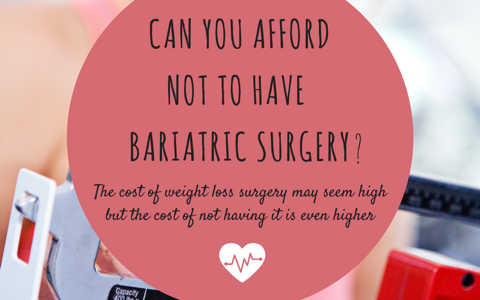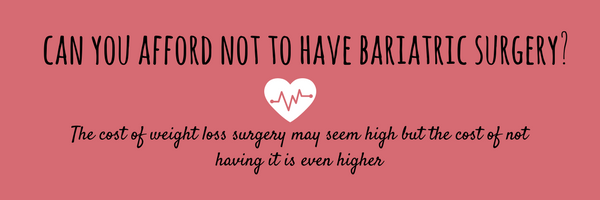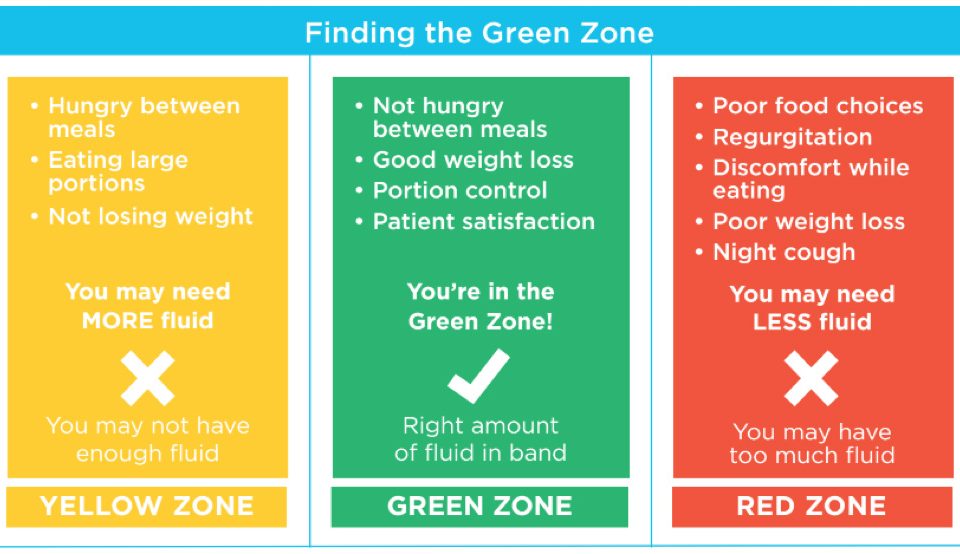
Can You Afford Not To Have Bariatric Surgery?
The cost of weight loss surgery may seem high but the cost of not having it is even higher
Weight loss surgery is the only proven solution to achieve sustainable weight loss, yet only 1.5% of suitable candidates are seeking surgery to combat their battle with obesity. This indicates that only 1.5% of obese adults in Australia are committed to improving their health, reducing their risk of disease and extending their life expectancy.
Fear of social judgement, fear of failure and the cost involved, are just some of the reasons why so many are sticking to more conventional weight loss strategies and shying away from bariatric surgery. But are these valid reasons to put off having life changing surgery? . Recent research from Europe indicates they may not be valid at all; well at least the financial reasons may not be.
Did you know that a BMI more than 35 incurs $3,000-$10,000 in annual health care costs?
The true cost of delaying or not having bariatric surgery is two fold. There is the actual dollar value (as mentioned above) and there is the cost to the health status of the individual, where health status refers to the disease risk and life expectancy.

First, let’s take a look at disease risk.
Weight loss surgery is associated with an 11% reduction in heart attack risk and a 29% reduction in type 2 diabetes. It is also proven to help with sleep apnoea and mental health. But, delaying bariatric surgery by just three years may lead to a loss of clinical benefits and a reduced life expectancy.
Research has shown that delaying weight loss surgery until BMI is over 50 can result in poorer health outcomes for the patient.
There is fear that Australian’s are becoming de-sensitised to what obesity looks like. With 60% of the Australian population being overweight or obese, it’s easy to feel a healthy weight among society even when the BMI indicates otherwise. The reality is that the higher the BMI creeps the shorter the life expectancy and the lower the chances are of ever reversing existing weight related health conditions such as sleep apnoea and type 2 diabetes.
One bariatric surgeon from the US has found that medically supervised diet, exercise and pharmacotherapy programs prior to bariatric surgery (that attempt to shed weight and educate patients) do not serve to prepare patients in any more of a useful way than the two week pre-operative VLCD does. These extended pre surgery interventions are delaying surgery and robbing patients of better health outcomes.
The best outcomes are seen in those who have a BMI less then 40 at the time of surgery. These people are not only more likely to achieve a BMI under 30 but also comorbidity remission.
Now let’s look at the impact delaying surgery has on life expectancy.
A BMI over 30 results in a 50%-100% increased risk of premature death compared to individuals of healthy weight.
Moderate obesity (BMI 30-35) reduces life expectancy by 3 years while morbid obesity (BMI over 40) reduces life expectancy by 10 years.
It is true that the decision to have weight loss surgery will mean spending more money on items such as new clothing, dietary supplements, fitness and check up appointments. But significant cost savings will be noticed in food bills, medication and medical bills. One bariatric surgery patient has reported a saving of $8,400 per year on food bills alone.
Bariatric surgery pays off in the long-term, money wise and health wise.
If you just look at the dollar, research has now proven that bariatric surgery is cost effective at 10 years and cost saving over a lifetime.
In light of this new research, now might be a good time to consider if you can really afford to put off having bariatric surgery any longer.



